- From Faith Current: “The Sacred Ordinary: St. Peter’s Church Hall” - May 1, 2023
- A brief (?) hiatus - April 22, 2023
- Something Happened - March 6, 2023
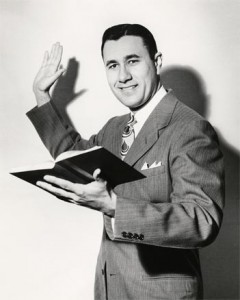
Oral Roberts: John Lennon’s secret penpal?
MIKE GERBER • Commenter Karen brought something to my attention recently that I certainly had a strong reaction to, and thought Dullblog readers would, too. In January, 1973, American televangelist Oral Roberts claimed in a speech that he’d received a letter from “ex-Beatle John Lennon.” The letter, which he said was handwritten, detailed John’s misery at his life as a Beatle, and his desire to be saved by Jesus Christ. You can read about it all here.
I’ve been wrong before, but I would be willing to wager $100 right now that this letter is a fake.
It misquotes song titles, misnames Julian as “John,” claims that Lennon was kiting checks (not impossible with the financially loosey-goosey Lennon, but even Albert Goldman didn’t unearth anything like that) and is incredibly ill-written and incoherent. It doesn’t sound anything like John Lennon, in prose or speech, drugged or sober. It does, however, sound exactly like what a cheesy TV preacher, unhip on a cellular level, might think John Lennon the famous druggie rock-n-roller would sound like. Parts of it sound like the old Beatles cartoon.
Could it be real? Sure—as I recently commented over at Dangerous Minds, John Lennon was a protean character who loved the put-on, which makes him catnip to both sides of the culture war. But this letter is so far at variance from the rest of the data, I’d need a lot more than Oral Roberts say-so to believe it.
C of E, Atheist, or Holy Roller?
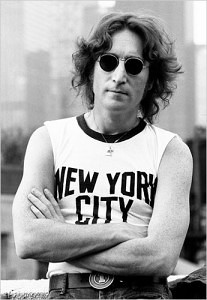
Lennon wearing a cross.
John was raised Church of England but—as the “more popular than Jesus” comment alluded to—that organization was nothing like the muscular, forthright, extremely political Christianity then more prevalent in the American South and now more widespread generally. During the Beatle years, John’s views seem to be solidly agnostic—conscious of the possibility of God, and perhaps even hoping for it, but not claiming certainty. There’s plenty of room in this attitude for a relaxed cultural Christianity and the Maharishi, or Babaji, or Swami Bhaktivedanta, or reading books about Milarepa.
So with this attitude, John was known to watch a televangelist or two, and was a pretty suggestible fellow; it’s not totally absurd that he would catch some holy-roller on a UHF station and dash off a letter, particularly if he were in an altered state. I’ve read about Lennon’s brief Born Again phase (spring 1977), and have never found any reason to doubt that it happened. But this supposed Oral Roberts letter isn’t any version of John I recognize, as a person or as a prose writer. And, tellingly, the original cannot be found. Maybe some of you feel differently and think the letter is real; I’d be fascinated to hear why.
Veracity aside, there are two parts that interest me: the first is, no one affiliated with the Estate has expressed any opinion about this letter. That surprises me, because it was even mentioned in Oral Roberts’ obituary in The New York Times. It’s not a new thing, apparently.
The second part is how after 1968 or so, John Lennon seemed to exist more as a symbol than as a person. While this makes some sense after a person’s death, what’s striking in Lennon’s case is how much it happened while he was still living, and doing things that were at odds with his iconography. I think that was what “the Lost Weekend” was about, frankly—resentment over being put into a box, and determination to live as he wanted to live (and how his contemporaries were living). This great restricting aspect of modern celebrity is, I think, very difficult to navigate; people must perceive you through a scrim of legend. And because people tire and legends do not, one usually watches the person fade as the legend grows brighter; think Charles Chaplin, or Lennon’s neighbor Greta Garbo. Garbo’s tactic was to let the legend occupy the public space, while the person lived the life of an ordinary (but well-off) Manhattan housefrau. I think that was what Lennon was trying to do from 1976-80, after “breaking out” hadn’t worked.
Paul McCartney uses a different version of the Garbo technique—but because he sees that denying access only builds an appetite for more access, he lets the public Paul do the public things, and maintains a private person in a protected space. Nancy has talked about this extensively and well. For me, I think it’s summed up in Paul’s song “That Was Me“—which is itself the technique I’m talking about: Paul revealing something private (this split in how he thinks), in the most public way. This stratagem seems to be really successful, if you can pull it off. One can be known by the public, but also have a place out of publicity’s glare. I personally have never doubted that Paul McCartney is a Christian—but in that mellow, C of E by-way-of-the-Sixties manner. I also have never had any great caring one way or the other, so Paul is free to do, or not do, as he pleases.
Distorting Lennon and Christianity
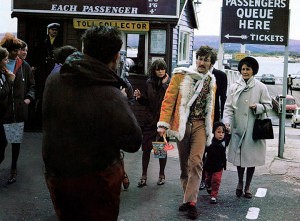
Lennon in full “Utopian Sixties” regalia, 1967.
When it comes to John and Jesus, evangelical Christian groups increasingly claim that he was on their side, but that’s a distortion for political gain. Just like it’s a distortion to claim that since John didn’t like taxes (what rich person does?) he was a Reaganite. A quick perusal of these stories show that they are a single source being propagated by the right-wing talking to itself. Right-wingers equate John Lennon with the Utopian Sixties, and since the mere existence of those years bother the heck out of them, “proving” that Lennon wasn’t really the hippie he seemed looms large for them.
But just like the Utopian Sixties had strong connections to Vatican II, there’s plenty of evidence that John Lennon was interested in Christianity—given his wide-ranging mind, how could he not be? And had he lived, it seems possible that he would’ve lent lip-service and support to groups and causes of every stripe, shady, saintly and in-between. (That’s why he thought people were unwise to look to celebrities to figure out what to think.)
The TL;DR on John Lennon and Christianity
Underneath this surface changeability John Lennon’s beliefs seemed to be remarkably stable:
“Our society is run by insane people for insane objectives.”
and
“I believe in God, but not as one thing, not as an old man in the sky. I believe that what people call God is something in all of us. I believe that what Jesus and Mohammed and Buddha and all the rest said was right. It’s just that the translations have gone wrong.”
and finally
“If someone thinks that love and peace is a cliche that must have been left behind in the Sixties, that’s his problem. Love and peace are eternal.”
John Lennon’s tolerance for a religion—the social and financial expression of a ontological philosophy—seemed to be directly proportional to how fully it agreed with those statements. So while it’s possible that he could go through a born again phase, that simply couldn’t last; not because of Jesus, but because of born again culture, particularly in the US in the late 70s. And the idea that he’d reach out to Oral Roberts—his absolute cultural opposite—in a way which he knew would become immediately public seems preposterous. To me the letter’s an obvious forgery, an attempt by someone to win countercultural converts and weaken Lennon’s standing in the New Left.
You don’t have to work hard at all to construct a Lennon who believed in the humanistic side of Christianity. You have to work very hard, however, to make him part of today’s Laffer-loving, God-and-guns right-wing noise machine…but we shouldn’t be surprised when people try.
I’m sure people have lots of thoughts about this topic; I look forward to reading your comments. Is the letter real? Was John’s dalliance with born-again Christianity just that, or something more? Exercise your freedom of squeaks below.

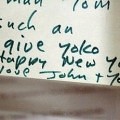
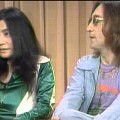
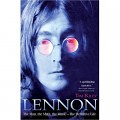
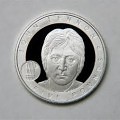
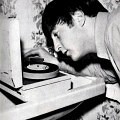
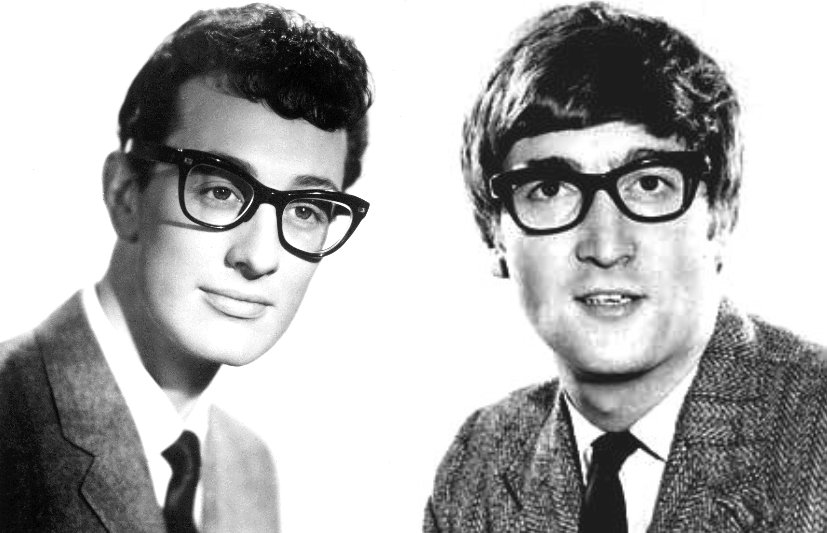
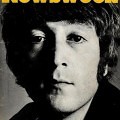
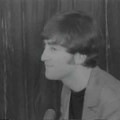
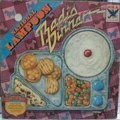

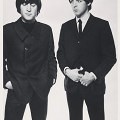
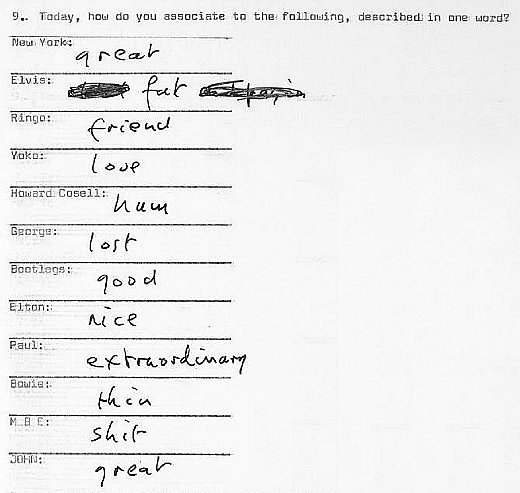
The letter does beg belief, that’s for sure. It does not “sound” like John at all–even a stoned one.
I have a pet theory as to what happened: John did write a letter (we all know how fond he was of doing that) and the letter was lost by the time Roberts wanted to read it on air. Some of his flunkies then typed up a phoney one, based on Roberts’ faulty memory and their own embellishments. Someone had some very basic beatle knowledge (calling Julian “John” for example. Back in the day, Julian was known to fans as “John Junior”) and got creative.
As to why Mrs. Lennon–who we know is the most litigious person in North America–wouldn’t have sued the Roberts estate is a mystery. Maybe she’s afraid the real letter will show up.
Karen, your version makes sense. From reading the post Michael cited, it’s clear that Roberts was interpolating bits as he read the letter out loud. I found this quote from the post fascinating:
“We have looked for the original for years, but it is nowhere to be found,” explains Roger Rydin, curator of the Oral Roberts University (ORU) archive. “We have done a good job over the years of keeping up with these kind of items, but this one got away. We had a researcher here in 1985, and it was ‘lost’ then, and has not been found since.” So they didn’t even make a copy? That’s amazing — the most famous letter they’ve ever received.
I can believe that Lennon wrote something to Roberts in a moment of emotion, but not that he penned the letter as it appears in this post / Roberts’ book. As to why the Lennon estate hasn’t said anything about the letter, maybe it’s because it’s hard to prove a negative, especially if there’s any truth to Lennon’s having contacted Roberts. And publicly disputing the details of the letter might just draw more attention to it.
Michael, on McCartney and religion: my sense is that he’s much closer to the liberal, all-faiths-are-essentially-one attitude. I recall reading that he was considering converting to Judaism after marrying Nancy Shevell, and that he carries a Buddha statue with him on tour. He’s completely consistent and serious about his commitment to vegetarianism and animal rights, but I think much more loosey-goosey about specific faith issues. (At least, that’s what he lets us know!)
Just as I absolutely doubt that the letter as presented was written entirely by Lennon, I also doubt that the correspondence is an entire fabrication. The letter was allegedly sent in 1972, and Roberts was originally sermonizing about it in 1973. If the whole thing were faked up, wouldn’t Roberts have been concerned that Lennon and Ono would publicly deny it?
That’s why I lean towards thinking that Lennon sent Roberts some kind of letter, a letter which was then typed by someone else (and probably embellished) and then talked about publicly (and probably embellished some more). And then, conveniently, the original handwritten letter and the typed version were both lost — and no one made copies of either.
The letter as presented certainly reads like someone including a potted biography for people who might not know who Lennon is. That and the weird phrasing and mistakes about song titles, etc. make it pretty clear that if we’re getting Lennon at all here, we’re getting him through a few filters.
Another thing: the actual content of the letter isn’t, in many ways, all that surprising. A lot of things in it are things Lennon said publicly elsewhere: he only married Cynthia because she got pregnant, the Beatles split up because he and Paul couldn’t get along anymore, he didn’t like a lot of aspects of being a Beatle. And, as Michael pointed out, there’s evidence for Lennon’s “born again” phase letter in the 70s.
Even more importantly, to my mind, there’s plenty of evidence for Lennon’s searching for answers in spirituality and religion. It seems to have been very linked to Lennon’s trust for individual people — for example, not astrology in general, but this particular astrologer. And that’s in line with the way he put faith in individuals more generally (Yoko, Alan Klein, etc.). So I find it somewhat believable that he’d respond to Roberts in a moment of depression/weakness — there’s a reason televangelists are effective at getting people to watch and send money.
For me this whole thing is interesting primarily as a reminder that Lennon’s beliefs weren’t as fixed as they are often presented as being.
Karen that is a good point. I never thought of that. I was racking my brain trying to figure out why this letter sounded so ‘off’ and not like John at all, while also thinking that it was not unlike him to write a letter to a TV evangelist asking to be saved. Like you Michael, I know about his brief, intense, interest in Christianity. He is even reputed to have gone to a local church (perhaps it was even St. Patrick’s Cathedral) for Easter Mass with Yoko and Sean that year (1977). We all know that John was an obsessive TV fan so it’s not hard to imagine him watching Oral Roberts. I believe he watched anything and everything on TV, keeping it on all the time. It’s also very likely that during his foray into Christianity he would have watched Oral Roberts. It’s not hard to believe that in his apparent desperation, he would have wanted to write Roberts a letter. All of this is realistic to me. However, then we see the letter, and it reads as if it was written by someone else. The only way John could have written a letter like this one, is if he was roaring drunk. In the letter he claims to be on pills. Unless they were Quaaludes or some other type of downer, he would not sound so inarticulate. As for calling Julian ‘John’, I remember reading in one of the early bios that Julian’s full name is, John Charles Julian Lennon. Nevertheless, no one ever called him anything but Julian, so why would his own father suddenly call him ‘John’? In addition, although John and Paul misremembered some things, like the titles of their Capitol albums, dates, and perhaps who sang what, they never misremembered an entire song title. Calling the song ‘Can’t Buy Me Love,’ “money can’t by me love” is simply ludicrous. In many interviews, John made a point of saying that was the first time they started with the chorus and the original title of the song was Money Can’t Buy Me Love but they changed it. So why would he suddenly give it the wrong title? It does sound Karen, as if someone with an almost nonexistent knowledge of the Beatles did a lot of guessing and tried to write a letter as if it came from John. Although it is interesting that the author mentions Paul so often, throwing him into just about every situation. Paul had to hold John down when his father visited, Paul Paul Paul…I do wonder if someone with such a basic knowledge of the Beatles would mention Paul so much. Wouldn’t they mention George and Ringo too? Insert them into the various incidents instead of always Paul? I’m not saying this means that John himself wrote the letter. I wonder though, how someone with so little knowledge would seem to understand how important Paul was to the equation, while most Beatle authors and even some fans, can’t even get that right. On the other hand, am I reading too much into this? Could it be because they were the song writers the author simply surmised that Paul was often present in John’s life? In any case, this is a fascinating post Michael. I hope more people come on board.
Another thought: the letter reads like it was written by a young fan/Roberts flunkie whose first language isn’t english. “….paranoids me?” John would have to be pretty stoned to butcher the english language that badly.
Also, Roberts said that he was reading a typed version of the letter because he couldn’t read John’s handwriting. Could the translator have misread the original letter that badly and made such horrendous errors?
All of these what–ifs are predicated on the assumption that John wrote A letter, if not that one. Anyone out there think that the whole thing is a fabrication by Roberts himself, or someone on his staff?
Anyone out there think that the whole thing is a fabrication by Roberts himself, or someone on his staff?
I believe there are three possibilities :
• A prank by a jaded and cynical Beatle/John fan. Someone who skimmed the various biographies of Lennon’s life decides to prank the Roberts organization and John. But he lacks the talent to capture Lennon’s voice.
• Someone in the Roberts organization, perhaps Roberts himself, dreams up the fraud. Maybe he thinks all those counter-culture Beatle fans will suddenly reach into their wallets and contribute to Oral Roberts Inc. ® when they believe their savior John endorsed the wise and powerful Oral.
• Here’s a horrible theory: maybe it was the brain-damaged MDC (I refuse to type out his full name) who thought that by composing and sending this letter, it would become reality, and his doomed hero would somehow be saved. Schizophrenics often write confused letters in the belief they can shape reality.
That letter is so phony, they haven’t yet invented the word for it. Nor can I believe it is even based on an authentic prototype. Stranger things have happened than John Lennon writing to Oral Roberts begging, in essence, to be Saved. But “stranger things have happened” is no evidence of anything happening, and it goes against the record to imagine John prostrating himself so completely before anyone or anything other than Yoko.
Lennon’s beliefs were about as fixed as a willow in the wind. He had a weakness for daddies (while excoriating the same weakness in others; vide his snide comments on Dylan’s born-againness) and for Big Systems. Religion and politics being the Biggest Systems yet molded by the mind of man, he couldn’t stay away from either for very long. But he never ran for office, and if he ever wrote to Oral Roberts, I’ll eat my left elbow.
the evidence of the possibility, as it were, is John’s own confession in the Rolling Stone interview that he had a brief attachment to a certain tv preacher. I think Philip Norman also referenced this in his book.
I can’t believe nobody’s mentioned this so far, so I’m going to have to: what was going on in John Lennon’s life that might’ve created a letter like this? An obviously fake letter sent under his name which seemed to undermine his countercultural bona fides? A public admission that his hippie life was a mess and that what he craved was some of that Old Time Religion?
Here’s a hint: http://youtu.be/NTfyVYqYL90
And here’s another: http://www.lettersofnote.com/2012/01/king-like-all-frauds-your-end-is.html
That letter was supposedly the work of a black American outraged by Martin Luther King, but it was penned by a (fantastically racist) white FBI field agent. It’s what I thought of when I read this Roberts letter—some schmoe holed up with the Davies bio, a couple of copies of Rolling Stone, and too much time on his hands.
As the folks on sports radio say, “I ain’t sayin’…I’m just sayin.'” But given the time and the place and the people who were in the White House and their fondness for frat-boy level “ops,” it should be a part of this discussion.
That theory hadn’t entered my mind, but it seems the most likely. Some “short-haired, yellow-bellied, son of tricky dicky” wrote the letter to embarrass and discredit Lennon. I can see the agent sitting there with his wing tips and crew cut, chain-smoking marlboros as he scrawls this parody, drawing on knowledge gleaned from skimming the Davies biography and some interviews. After sealing the envelope, he sits back, takes one last drag from his cigarette, and stretches contentedly, knowing his day’s work is done.
A few days later an idiot at Roberts® Inc. receives the letter, types it up (badly) for the boss, then promptly “loses” the original.
While all this is going on, Lennon is taking hits from his six hundred year old hash pipe and obsessing over the clicks he hears on his phone, while Yoko is in another room, buying cows and fur coats.
If that’s the case, the government was in dire need of better ghost writers who knew something about their subject. 🙂
“lennon’s cousin, marilyn mccabe”?
who?
If the letter was a fraud, why didn’t lennon himself deny it. I’m sure the word got back to him that Oral Roberts spoke to a large crowd of the letter he received from Lennon. Lennon was shrewd, and would be quick to deny anyone fabricating a lie about him.
Because–and this is just a guess–that Lennon felt that denying it would give the story “legs.” Lennon was hyper-sensitive to others using his fame for their own gain, and also realized that interacting with every negative story would only attract more negative items. Why did Paul McCartney never deny Francie Schwartz’ book? Same reason.
But we’re just guessing here. Only one guy knows if the letter was legit, and he’s dead. Sadly. 🙁
“Why did Paul McCartney never deny Francie Schwartz’ book? Same reason.” As far as I know Paul indeed denied that book by Francie. He said she only wrote lies and nobody should pay attention to that. That is what I read somewhere.
Whether this letter came from John, for me, does not detract from the fact that he was almost obsessed with Christianity and/or religion and/or higher power. He was always seeking and questioning.
Yes, he had that born again phase in the late 1970’s (circa ’77), but the photo above, of him in the New York City t-shirt when he was wearing a crucifix, was 1974, long before that “born again,” phase. There are other photos from the “lost-weekend” days (taken by May Pang) where he is wearing the same cross. He was raised C of E. He was a choir boy. He, along with the choir, used to sing at church weddings on Saturdays, and get paid for their service. Then he was kicked out of choir for being naughty. His early writings in the Daily Howl included excerpts like: “The kindly Vicar of a parish, has kindly donated a kind donation, which he kindly decided to kindly donate to the Society of…” Lennon read extensively on and often spoke about religion, which is what got him into trouble in the Bible Belt south with his “Beatles are more popular than Jesus,” comments. In the ‘Ballad of John and Yoko,’ from “Skywriting by Word of Mouth,” he states: “I always remember to thank Jesus for the end of my touring days; if I hadn’t said that the Beatles were ‘bigger than Jesus’ and upset the very Christian Ku Klux Klan, well, Lord, I might still be up there with all the other performing fleas! God bless America. Thank you, Jesus.” http://imaginepeace.com/archives/9838
In his last interview with Playboy in 1980, he states, “I’m a most religious fellow.” Believe it or not, that I believe. He believed, he just questioned. Look to “A Spaniard in the Works” and the passage “I Believe, Boot…” where he chastises the Catholic Church and C of E for its wealth meanwhile people less fortunate have no place to live. “Why, if Griff is so good and almighty — does he bring such misery to the world?” the vicar in this passage asks himself in the opening paragraph. (This particular selection also could be considered racist, but it’s main focus is on religion.)
I agree with those here who say that the notion of this letter is not beyond Lennon’s purview. As we all know, he definitely had a penchant for letter writing. Imagine if he were around when the internet hit? He’d be posting up a storm and emailing up the kazoo if you ask me! Far as citing the wrong title for “Can’t Buy Me Love,’ in one interview he calls “Glass Onion,” “Green Onion,” then chides himself for not getting the name of his own song right. And if he were on drugs??? Couple that with the fact that his handwriting was not ideal Palmer penmanship. If someone made an attempt to type it up, they could have certainly made mistakes in words, usage, punctuation, even intent. If John was truly at a low point, he may have reached out in this way to a TV preacher. I wouldn’t put it past him. The fact that the estate has not commented either way could also mean that he did make such overtures. And yes, although known as Julian, John’s first son is John Charles Julian Lennon.
I highly doubt it was an attempt by the FBI to discredit Lennon. But then, what do I know?
Enjoy this demo of a song Lennon wrote called “Help Me to Help Myself”
http://www.youtube.com/watch?v=dZfNsOn7b94
Well I tried so hard to stay alive
But the angel of destruction keeps on houding me all around
But I know in my heart that we never really parted
Oh no
They say the Lord helps those who help themselves
So I’m asking this question in the hope that you’ll be kind
Cos I know deep inside I was never satisfied
Oh no, Lord help me
Lord help me now
Please help me Lord, yeah yeah yeah
Help me to help myself
Help me to help myself
And what a great song it is. I love he asking the lord to ‘help me to help myself”. Clever. Let’s not forget that phase he had thinking he was the Jesus himself. A reincarnation of Jesus. It is Paul’s biography, if I remember well.
I remember reading that Mark David You Know Who went through a phase where he was writing letters and signing them John Lennon. Could this be Mark’s work?
I wish I could remember the name of the book, but one of them has an anecdote about John&Yoko’s difficulties with the hired help.
People were always being hired and fired. Some employees were sticky fingered. And one employee who turned out to be a mentally ill but deeply religious person, used their letterhead to write letters to various celebrities.
I’m guessing this is what happened.
Does anyone else remember the anecdote, and the name of the book?